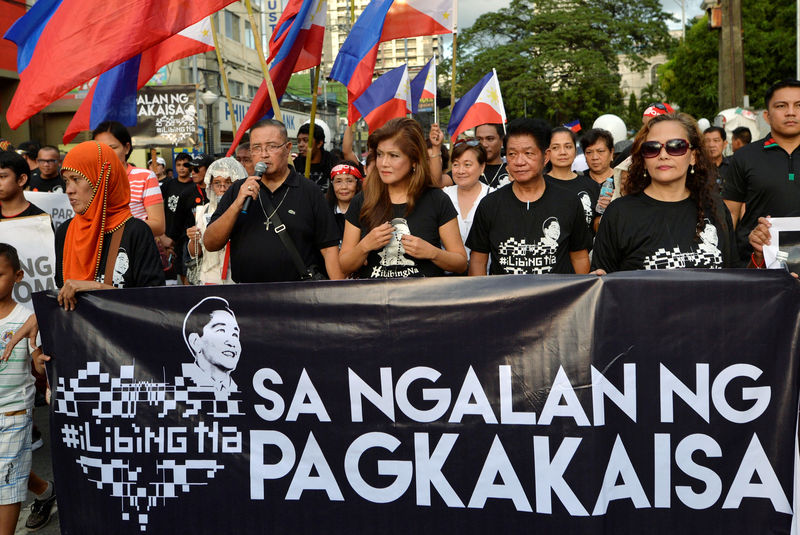MANILA (Reuters) - The Philippine Supreme Court on Tuesday cleared the way for a hero's burial for former dictator Ferdinand Marcos, resolving an issue that has divided the nation since his death in 1989, three years after he was ousted in a "people power" revolt.
Voting 9-5, the Supreme Court threw out petitions filed by leftist activists and victims of human rights abuses, ruling that President Rodrigo Duterte was within his powers to order that Marcos be buried in the heroes' cemetery, south of Manila.
Saying he was fulfilling a campaign promise, Duterte ordered the army to bury Marcos at the cemetery in August, prompting anti-Marcos groups to seek a ruling from the court.
Marcos's son and namesake, Ferdinand Marcos Jr, described Tuesday's decision as "magnanimous" and expressed hope it will "lead the nation towards healing".
Duterte shared the sentiment.
"We hope the matter will finally be laid to rest, and that the nation finds the wherewithal to move forward and to continue forging a nation that is peaceable, just and fair to all," Ernestor Abella, the president's spokesperson, said in a statement.
More than a hundred Marcos supporters, carrying Philippine flags and wearing Marcos T-shirts, gathered outside the Supreme Court and cheered the decision.
But others were angry.
"This is not just a sad day, it is a day of outrage - for the victims of the dictatorship, for the survivors of martial law and for the generations that experienced fascism at its worst," Renato Reyes, secretary general of left-wing activist group Bayan (Nation), said in a statement.
"Our protests will hound Marcos all the way to his grave. We will tirelessly campaign so that future generations will never forget. And we will continue to cry for justice for all Marcos victims."
Marcos ruled the Philippines for 20 years, during which time he, his family and cronies amassed an estimated $10 billion in ill-gotten wealth, a commission found, and thousands of suspected communist rebels and political foes were killed.
His wife, Imelda, denies amassing wealth illegally.
Previous governments refused to allow the Marcos family to bury him at the cemetery amid opposition.
Marcos, who died in exile in Hawaii, was a soldier and guerrilla leader during World War Two when the former U.S. colony was occupied by Japanese forces.

His embalmed body is currently on display in a mausoleum in his hometown in the northern Philippines.